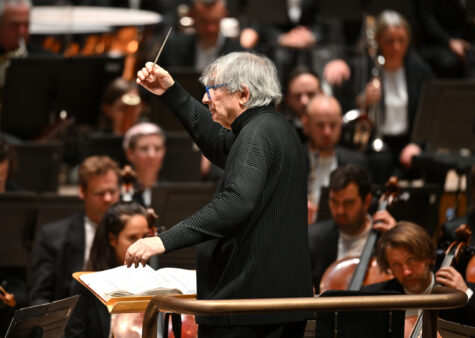 United Kingdom Mahler: Siobhan Stagg (soprano), Alice Coote (mezzo-soprano), London Symphony Chorus (Chorus Director Emeritus: Simon Halsey), London Symphony Orchestra / Michael Tilson Thomas (conductor). Barbican Hall, London, 20.10.2024. (JR)
United Kingdom Mahler: Siobhan Stagg (soprano), Alice Coote (mezzo-soprano), London Symphony Chorus (Chorus Director Emeritus: Simon Halsey), London Symphony Orchestra / Michael Tilson Thomas (conductor). Barbican Hall, London, 20.10.2024. (JR)

Mahler – Symphony No.2, ‘Resurrection’
When Michael Tilson Thomas came to conduct Mahler’s Third Symphony at the Barbican in May, and at the first performance became confused before the final movement (review here), I was unsure due to his ill health whether he would return for Mahler’s Second. But not only did he return, he was in very good form. Tilson Thomas turns 80 in December and only used the chair provided for him on the podium at the end of the long first movement. I was a mite disconcerted when Tilson Thomas started the concert with a quip to the first violins, but no harm was done.
This composer and this symphony are very much in Tilson Thomas’s blood; he trained the chorus for a performance of this symphony under Leonard Bernstein. He has recorded it with the San Francisco Symphony twenty years ago and will have performed it on countless occasions. The adulation began as soon as he appeared from offstage, and the standing ovation was more a testament to his decades of music making than this particular performance, though Mahler’s Second always ensures a rousing reception.
In its own poignant way, this concert was almost a form of resurrection in itself; we can only hope and pray that Tilson Thomas, diagnosed in 2021 with an aggressive form of brain cancer, lives a long life and is able to continue on the podium.
The orchestra played sublimely for him. I single out the strings who were silken, the woodwind mellow. The leader, Benjamin Marquise Gilmore, shone, as did the principal oboe Juliana Koch. The brass were perhaps not on their very best form but it mattered not – the performance was of high quality and Tilson Thomas’s attention never wavered, all crucial entries were signalled and the chorus watched his every gesture.

The inner movements came off best. The short second movement (Andante moderato) was ravishing, the shock of the ‘cry of disgust’ (or is it a death shriek?) in the third movement, a scherzo in all but name, hit home, perhaps sprightly rather than ferocious. Offstage bands were perfectly placed. The long first movement (Allegro maestoso) avoided mimicking Bernstein with his histrionics, the lyrical sections most tender; Tilson Thomas was restrained, never hectic. Alice Coote delivered her Urlicht immaculately, with the clearest of diction, impressive volume control and perfect intonation, a highlight of the symphony. Australian soprano Siobhan Stagg soared when required, but at times could have been more audible (as in ‘Du warst nicht umsonst geboren! Hast nicht umsonst gelebt, Gelitten!). My thoughts constantly turned to Tilson Thomas’s condition – he is certainly leaving us a musical legacy.
The chorus were in fine form across all sections, singing mainly from memory. Interestingly they brought back Simon Halsey to train them in place of their newly appointed Chorus Director Mariana Rosas. The dynamic variations in ‘Auferstehn’ were most impressive.
This was not a shattering performance to blow you out of your seat but a more restrained, reflective one, completely in tune with the conductor’s own personal circumstances.
John Rhodes
